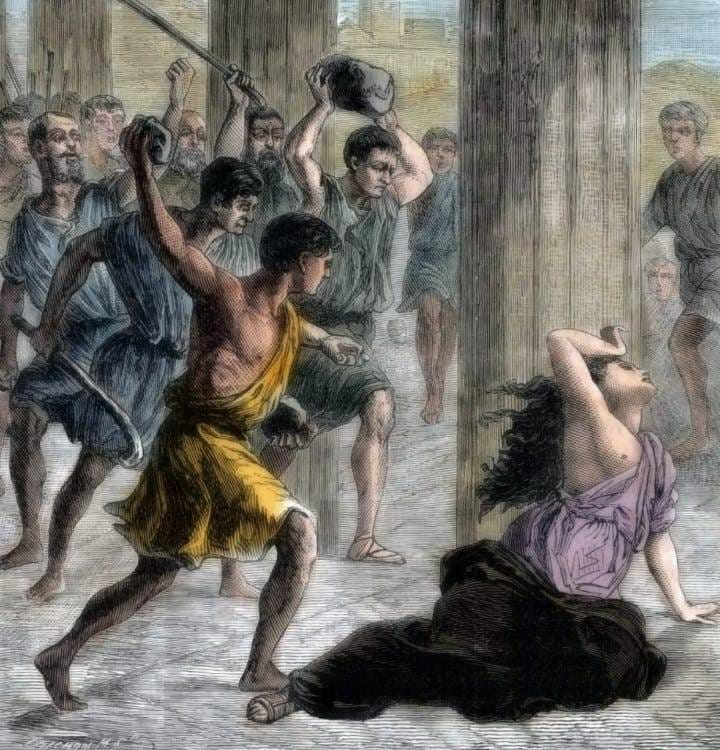What do Seashells, Women, Religion and Politics have in common? We will see just what that means this week, as we begin the Democratic Convention in Chicago. We will hear the GOP talking heads responding to the Kamala crush that is happening to the Republican party. We will certainly hear Trump and Vance deliver their bigoted and misogynistic responses to whatever transpires. They can’t talk about their own policy agenda because they would have to reveal the infamous Project 2025 platform. And they are trying to shy away from their own truth.
My wife and I recently spent a rejuvenating weekend in Monterey, CA, catching up with friends and beginning to prepare for an exciting sailing trip. Together, we gathered as the soon-to-be makeshift “crew” that will navigate the Virgin Islands aboard a 55ft Catamaran. In close quarters on the vast Caribbean sea, getting to know one another beforehand feels essential.
Knowledge can elevate human experience, but as the tale of Hypatia of Alexandria shows, it can also be perilous.
Hypatia was an intellectual powerhouse in the Byzantine Empire during the 4th century. Her story is both inspiring and harrowing—an intersection of gender, intellect, and the political-religious strife of her time.
Born around 355 CE, Hypatia lived in an era when the recently divided Roman Empire left Alexandria amidst religious and social upheaval. Christians, Jews, and pagans coexisted in a boiling pot of perpetual conflict, each vying to carve out their own boundaries in this culturally sophisticated yet tumultuous city.
Alexandria, founded by Alexander the Great in 331 BC, quickly flourished into a beacon of intellectual and cultural prosperity. Its legendary Library held more than half a million ancient scrolls, a testament to its stature as a hub of knowledge and thought amid an undercurrent of ignorance, slavery, and religious strife. Despite these challenges, Alexandria offered a sanctuary where men—and women like Hypatia—could elevate themselves through intellectual pursuit.
Hypatia was a thinker, teacher, and inventor of the highest order. Yet, she was also a pagan, embodying a courageous spirit in an era rife with religious divisions. Her intellect and fearlessness made her a target in a landscape where science often clashed with religious doctrine.
Hypatia’s unfortunate end can be traced back to her associations and her unapologetic existence as an intelligent woman in a male-dominated world. Her story intertwines with prominent figures like Orestes, the pagan-aligned civil governor of Alexandria, and Cyril, the influential Christian bishop. Tensions came to a head when Cyril’s conflicts with the Jewish community led to violent clashes and Orestes' outspoken opposition.
Though Hypatia was not directly involved in these political and religious confrontations, her friendship with Orestes and her prominence as a non-Christian intellectual made her an easy scapegoat. To a faction hungry for a target, her gender and nonconformity presented an irresistible bullseye.
Hypatia’s grisly death is particularly symbolic. She became the victim of a fanatical mob led by Peter the Lector. As she was pulled from her carriage, dragged through the streets, and brutally murdered with roofing tiles and seashells, her death marked the perilous intersection of politics, religion, and a patriarchal society's fears.
The aftermath was devastating. The University of Alexandria, where she and her father had taught, was burned down, thrusting the city into an intellectual dark age. In the wake of her murder, scholars and artists fled, stifling the city’s once-thriving intellectual life.
Hypatia’s death became a grim symbol of the dangers faced by those who challenge dominant paradigms. Her legacy, however, transcends her tragic end; she remains a poignant figure associated with the enduring struggle for intellectual freedom and the separation of church and state.
In contemplating her story, one might ask, what do seashells, women, religion, and politics have in common? They each play a part in a narrative that continues to ripple through history, reminding us of the bravery required to stand against ignorance and the often high cost of knowledge.
As we prepare to sail the Virgin Islands, navigating our own challenges and building our community, Hypatia’s legacy stands as a profound reflection on the enduring quest for knowledge and the freedoms it promises—and those who are willing to pay the ultimate price for it.
The tale of Hypatia of Alexandria, a beacon of intellectualism and a martyr in the struggle between science and faith, resonates with many contemporary issues. Her story highlights how political and religious conflicts can stifle progress and set the stage for intolerance and violence.
In both Hypatia's era and today, the quest for knowledge often conflicts with established belief systems. In Hypatia's case, her intellectual pursuits and her pagan beliefs threatened the Christian orthodoxy. Similarly, in modern times, scientific findings—such as climate science or evolutionary biology—may clash with certain religious or political ideologies, leading to attacks on scientific institutions and researchers.
Hypatia’s tragic end was, in part, a result of the prevailing patriarchal norms of her time, where a woman of intelligence and influence was seen as a threat. Today, although there has been significant progress in gender equality, women still face systemic discrimination and violence, especially in regions where political and religious conservatism are deeply entrenched.
The struggle for power between Orestes and Cyril mirrors modern political and religious power struggles where different groups seek dominance. The expulsion of Jews from Alexandria has echoes in modern-day ethnic and religious conflicts, where political leaders may exploit religious divisions for their own gain, resulting in persecution and displacement of minority groups.
Hypatia's murder was a brutal form of silencing dissent. In today's world, dissenting voices are often suppressed through censorship, imprisonment, or even assassination. Journalists, activists, and intellectuals in countries with authoritarian regimes or heavy religious influence may find themselves targeted for challenging the status quo.
The destruction of the Library of Alexandria and the University parallels modern attacks on cultural and educational institutions. Wars, extremist attacks, and political purges often result in the burning of books, the closing of universities, and the exile of intellectuals. For instance, the destruction of cultural heritage by groups like ISIS or authoritarian styled crackdowns on universities in various parts of the world show how intellectual hubs can be decimated. In fact, in our current political landscape we find in the GOP playbook titled “Project 2025” it is their intention to dismantle the Department of Education, discontinue funding to public schools, and privatize student loans as a start of their dismantling of the United States.
Hypatia's life underscores the importance of separating religious beliefs from governance and science. Today’s debates about the role of religion in public life, from laws on reproductive rights to the inclusion of creationism in school curricula, continue to reflect the tension between religious authority and secular governance.
Peter the Lector and Cyril's monks were religious extremists who considered Hypatia a heretic. Today, fanaticism still fuels violence, whether it’s religious extremists committing acts of terror or political partisans inciting violence to achieve their aims.
Hypatia's story is a stark reminder of the destructive power of intolerance and the vital need for protecting intellectual freedom and promoting inclusivity. The struggle between knowledge and ignorance, freedom and oppression, inclusivity and bigotry, persists. Understanding these historical parallels can offer valuable lessons for navigating our contemporary political and religious landscapes, ensuring that the death of intellectual and cultural pioneers like Hypatia was not in vain. Her legacy calls us to advocate for a world where knowledge is celebrated, diversity is respected, and intellectuals can pursue wisdom without fear of persecution.
If the GOP have their way knowledge will not be celebrated, diversity will not be respected and in fact will be outlawed, and intellectuals will be silenced. Educate yourself of the GOP and Trump’s Project 2025.
* * * * * * * * * * * * * * * * * * * * * * * * * * * * * * * * * * * * * * * * * * * * *
* * * * * * * * * * * * * * * * * * * * * * * * * * * * * * * * * * * * * * * * * * * * *
I welcome you to get your copy of my critically acclaimed book “Quantum of Justice - The Fraud of Foreclosure and the Illegal Securitization of Notes by Wall Street”! Based on the true story of my four year long lawsuit against Wells Fargo Bank for fraud. Learn what I exposed in the court and Wells Fargo could not and did not deny. Understand how anyone can take your home from you at any time whether you have a mortgage or not, or if you are current on your payments or not, or even if you paid cash for your property.







